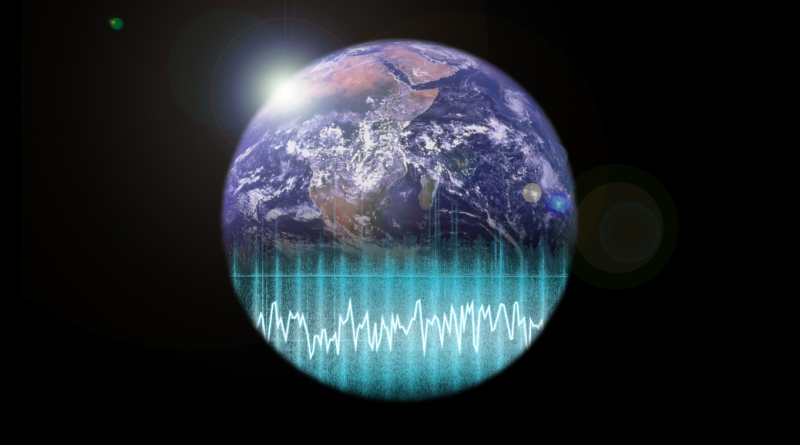INTERVIEW: Frederick Kennedy’s new audio work looks at noise reduction in 2020
Image: Rest, composed by Frederick Kennedy, looks at the reduction of noise during the coronavirus pandemic. Image courtesy of Ma-Yi Studios / Provided by Everyman Agency with permission.
The Ma-Yi Theater Company recently released details on their spring 2021 season, which offers many virtual theatrical presentations, including Frederick Kennedy’s Rest. This unique show, composed and written by Kennedy, features the voices of Emily Reilly and Hugh Farrell. Experiencing this audio meditation is free, and launches today, Feb. 25.
Here’s how Ma-Yi bills the theatrical experience: On July 23, 2020, international seismologists released a paper detailing how the coronavirus pandemic has led to a global noise reduction — apparently the longest and most coherent reduction in recorded history, according to The New York Times. This bit of extraordinary news inspired Kennedy, who is a sound designer, to start collecting data from seismographs and coupling the information with recordings of quarantine living. The result is Rest, a 16-minute audio meditation that contextualizes this year of pandemic life.
Recently Hollywood Soapbox exchanged emails with the composer about the new show. Questions and answers have been slightly edited for style.
When did you start working on Rest?
I began working on the idea last September after a chat I had with Ralph Peña, artistic director at Ma-Yi Theater Company in New York. Through their streaming platform, Ma-Yi Studios, the company has really been at the forefront of imagining new ways to engage theater makers in the face of pandemic closures and shutdowns, and Ralph was curious about the prospect of developing a sound-design driven project. They were generous and adventurous enough to commission this work before I even really knew what it was.
How did data collection factor into the development of this piece?
Realizing that there is a massive data trove of publicly accessible seismological data was really where this began. That said, the seismological material wound up being a prompt that led me in many directions. It’s more the bassline, or the spiritual anchor of this piece, as opposed to being the whole thing.
Do you have a science background? Was any of the data difficult to discern?
I’m not much of a scientist — I fell in love with music when I was 8 years old, and I’ve followed that ever since. I did grow up in a house full of analytical inquiry though. My father is a Ph.D. in theoretical physics, and there were lots of problem-of-the-day types of things in my family growing up. I was really shaped by both my parents’ passion for learning, and so it always seemed clear to me that the scientific, the spiritual, the artistic can and should coexist.
As for difficulty parsing the data — yes! The standard format for sharing seismological data is called SEED (Standard for the Exchange of Earthquake Data), and I went down a lot of rabbit holes experimenting with how to convert this into auditory information, using programs like MAX and MATLAB. In the end, I wound up working with a tool developed by the Incorporated Research Institutions for Seismology.
How would you describe this audio meditation to someone looking to experience it?
I discovered pretty early on that what is fascinating to me about the seismological data isn’t just the gee-whiz nature of being able to hear those sounds — though I do love that — but more so the realization that our daily routines as a species can have a measurable impact on a geophysical level. So Rest is really an opportunity to reflect on scale. What does it mean to listen, to see your world? What is one voice, one life, one day in relationship to the entire world? It’s very personal to me, but also a shared experience.
Although the pandemic has been a horrible plague, is there a silver lining that a lot of artistic inspiration has come from this past year?
I’d like to think so. It’s when things are darkest that we truly need artists to show us a new way to live. The work that Ma-Yi Studios is doing is kind of an amazing example of that, actually. If not for Ralph and the company choosing to commission this work as a direct result of the pandemic, I likely never would have made this piece. This pushed me in a whole bunch of new creative ways, and I know I’m not the only artist who’s been the beneficiary of these kinds of opportunities. In the midst of an extraordinarily difficult time, I’m very grateful for that.
Why call the piece Rest?
It’s a bit of a paradox — I don’t think anyone will be looking back on 2020 as restful. A lot of folks have been busier than ever this past year, especially people in essential services. Actual rest has been hard to come by for people in that situation, but also generally speaking for everyone. My pandemic experience has been one of isolation and tremendous amounts of repetition while we wait for ‘ordinary’ life to resume. Working on this piece through the fall really forced me to just be in the present and to move beyond frustration and absorb this time as it is. And I realized that the metaphor I kept coming back to was the idea of a rest in music notation. A moment in time that both shapes our understanding of the music that preceded it and prepares us for what comes next. It’s a moment of holding and waiting, filled with infinite potential.
By John Soltes / Publisher / John@HollywoodSoapbox.com
Rest, composed and written by Frederick Kennedy, launches today, Feb. 25 from Ma-Yi Theater Company. Click here for more information on the free production.

